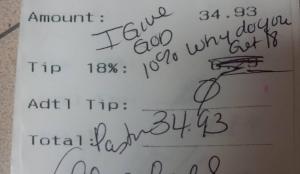 You know the stereotype about the cheapskate Sunday lunch church crowd who shortchange servers on their tips? Well, one pastor in St. Louis decided to try her best to live into this stereotype. She was mad that her church group got a mandatory gratuity charge for their gathering so she wrote on her receipt, “I give God 10%. Why do you get 18?” And then the server put the receipt up on the atheism page on reddit. Nice witness!!! Well I thought I would share some choice words from John Wesley for that pastor and any other Ebenezer Scrooges out there in the church Sunday lunch crowd. ***UPDATE: The pastor was identified; she complained to Applebee’s and got the server fired. Please pray that the server will be able to get a new job and that the pastor will be sanctified by this experience and not harassed by strangers.
You know the stereotype about the cheapskate Sunday lunch church crowd who shortchange servers on their tips? Well, one pastor in St. Louis decided to try her best to live into this stereotype. She was mad that her church group got a mandatory gratuity charge for their gathering so she wrote on her receipt, “I give God 10%. Why do you get 18?” And then the server put the receipt up on the atheism page on reddit. Nice witness!!! Well I thought I would share some choice words from John Wesley for that pastor and any other Ebenezer Scrooges out there in the church Sunday lunch crowd. ***UPDATE: The pastor was identified; she complained to Applebee’s and got the server fired. Please pray that the server will be able to get a new job and that the pastor will be sanctified by this experience and not harassed by strangers.
I’ve written extensively about what an amazing farce it is when Christians make no connection between the generous grace they have received from God and how they should then treat other people. The libertarian stinginess that characterizes much of conservative evangelicalism is one of the clearest signs that a major short-circuit has occurred in our theology. In any case, how about this whole 10% thing? Are we really supposed to give God only 10% and keep 90%? John Wesley sure didn’t think so. Here’s how he addresses this question in his sermon “The Danger of Riches.”
I do not say, “Be a good Jew, giving a tenth of all you possess.” I do not say, “Be a good Pharisee, giving a fifth of all your substance.” I dare not advise you to give half of what you have; no, nor three quarters; but all! Lift up your hearts, and you will see clearly, in what sense this is to be done. If you desire to be a “faithful and a wise steward,” out of that portion of your Lord’s goods which he has for the present lodged in your hands, but with the right of resumption whenever it pleaseth him, (1.) Provide things needful for yourself; food to eat, raiment to put on; whatever nature moderately requires, for preserving you both in health and strength; (2.) Provide these for your wife, your children, your servants, or any others who pertain to your household. If, when this is done, there be an overplus left, then do good to “them that are of the household of faith.” If there be an overplus still, “as you have opportunity, do good unto all men.” In so doing, you give all you can; nay, in a sound sense, all you have. For all that is laid out in this manner, is really given to God. You render unto God the things that are God’s, not only by what you give to the poor, but also by that which you expend in providing things needful for yourself and your household. [Sermon 87, “The Danger of Riches,” 2.8]
Everything we have belongs to God, not 10%, imbecile preacher! God does intend for us to provide for our families: “food to eat, raiment to put on; whatever nature moderately requires, for preserving you both in health and strength.” When Wesley wrote this, he assumed there would be a surplus and that every paycheck would be expended entirely, first on your family’s reasonable needs and then on the church’s reasonable needs and then on the poor.
What has entered into our consciousness as the values of capitalism have become more entrenched in the 250 years that separate us from Wesley is that it’s virtuous to save all the leftover money from each paycheck because it’s the responsible means of taking care of unexpected future emergencies and/or our retirement. Though I recognize the legitimacy of this rationale and I do think it’s important to plan ahead and save your money, it can create a huge trap in our thinking because you can never save enough money to be prepared for all possible contingencies in the future. Should we be entirely unfazed by the parable of the rich fool in Luke 12:13-21 who decided to plan for the future by building a bigger barn to hold his surplus grain (which is very reasonable by our values)? Is Jesus’ lily of the fields passage in Matthew 6:25-34 a pretty Bible verse we can politely ignore? (Oh well He just says not to worry about the future; planning isn’t worrying; blah blah.)
I think a happy compromise between 21st century middle-class piety and 18th century radical Wesleyanism is to be frugal with ourselves but extravagant with others, especially those of limited income. Because I got to know a lot of people in the restaurant and bar industry in my rock and roll band days, I’ve decided to tip 20% unless there’s a problem. Even when there’s a problem with the service, I usually feel bad punishing the person with their tip because I know how worthless I would be as a waiter. It would be such a nightmare if I ever tried to do it. I would probably get about 10% of the orders right between daydreaming, composing electronic dance music in my head, having theological epiphanies, and checking my iPhone slavishly.
It’s such an amazing irony that Christians who have received grace so lavishly from our savior would quibble over lunch tabs. But I’ll tell you what. That fruit testifies. Whatever theology creates that kind of behavior is an abomination. There are many rotten fruits like this in the orchard of American Christianity. The hard thing is finding the roots.











